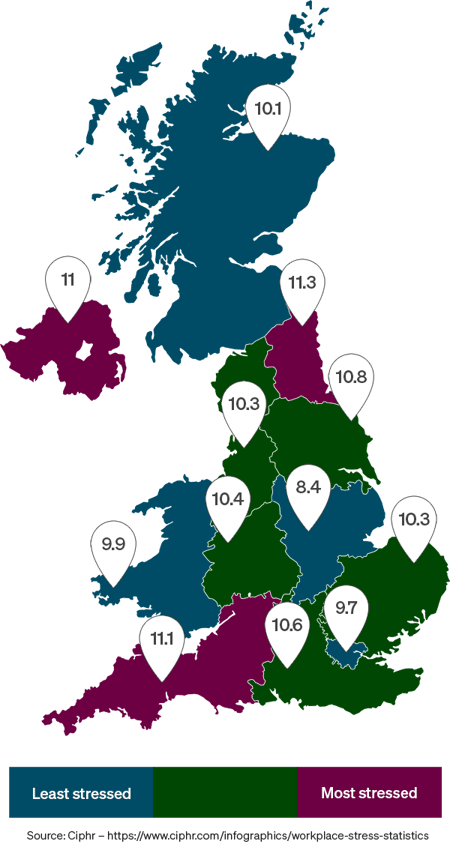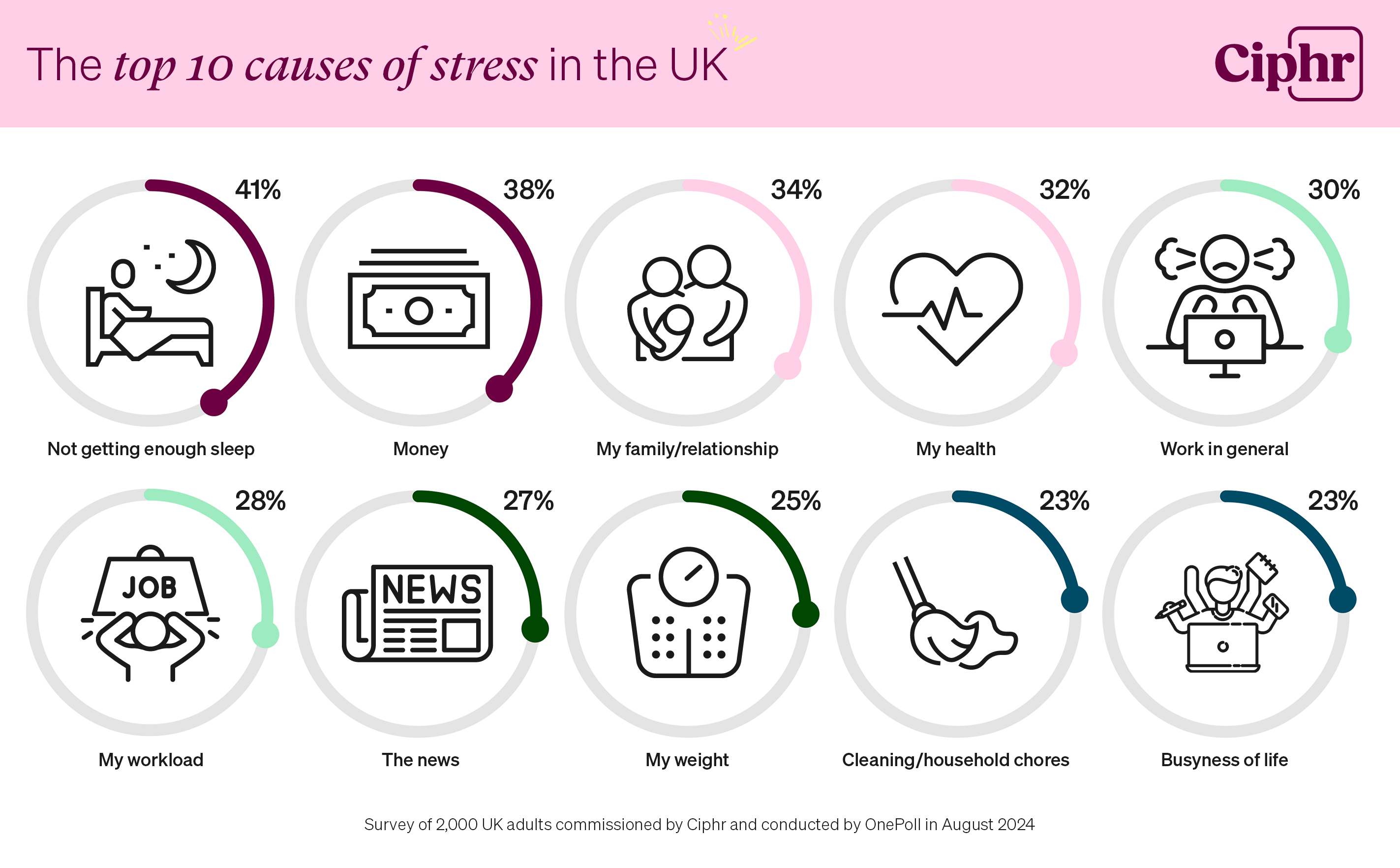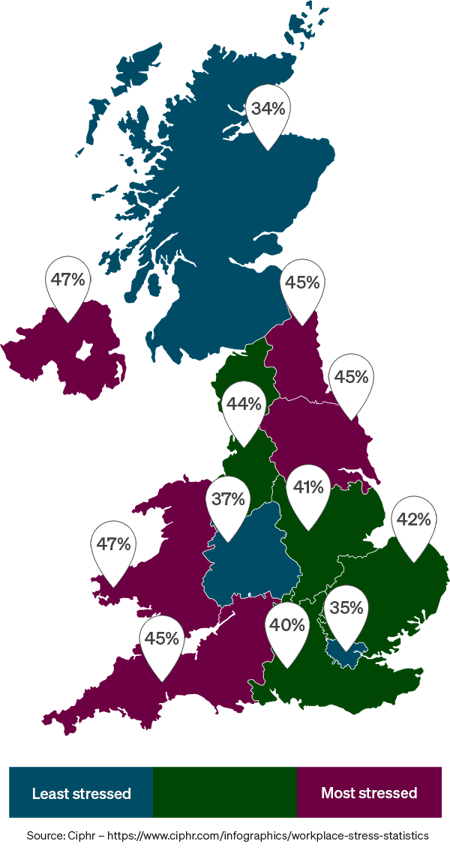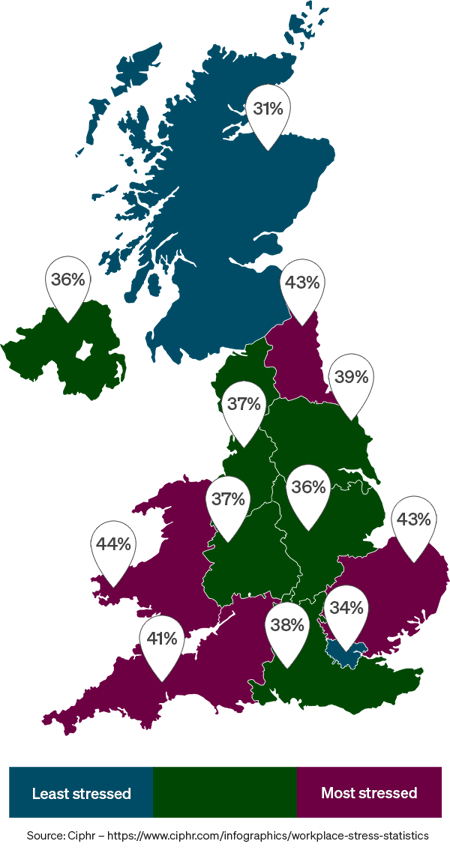Whether it’s workload, time pressures, issues with pay, holiday allowances or workplace dynamics, our jobs can be the cause of much stress in our lives.
Even for those of us who enjoy our careers and get along with our bosses – or are our own bosses – work life can be stressful, and it can be difficult to switch off and leave it all behind at the end of the working day.
That’s why we wanted to know how many people in the UK experience stress on a regular basis. And how much of an impact our jobs have on our stress levels.
Ciphr's new (2024) research into the incidence and causes of stress (in and outside of work) found that:
- One in nine (11%) UK adults feel stressed every single day
- One in four (24%) people in the UK feel stressed more days a month than they don’t
- Women experience stress more frequently than men. On average, women in the UK say they feel stressed for 11.7 days a month, whereas men say they experience stress for 8.7 days a month
What are some of our biggest stressors?
- Two-fifths (41%) of UK adults say that feeling tired and not getting enough sleep are the most common causes of stress in their lives
- Over a third (38%) are affected by money worries and financial stress
- One in three (34%) get stressed out by their family and/or significant other
- Nearly a third (30%) find that work in general makes them feel stressed
- And over a quarter (28%) say that workload demands cause them stress
Quick links:



How many people feel stressed in the UK?
In August 2024, HR software provider Ciphr commissioned a survey of 2,000 nationally representative UK adults, using OnePoll, to discover how frequently, if at all, people feel stressed in a typical month.
According to the results, 86% of people in the UK feel stressed at least one day a month. (In July 2021, when Ciphr ran an identical survey, it was 79% – which suggests that more people are stressed now.)
- On average, a typical UK adult feels stressed around 10.3 days a month. That’s over twice a week!
- Over half (60%) of UK adults report feeling stressed five or more days each month
- Over a third of UK adults (37%) feel stressed 11 or more days a month



Our survey also found that:
- One in nine people (11%) in the UK say they feel stressed every single day
- The number of UK adults who say they are stressed every day has increased by 57%, from 7% to 11%, since a similar 2021 survey commissioned by Ciphr (which suggests that we're getting stressed more often)
- Women are more likely to say they feel stressed every day (14%, compared to 9% of men)
- One in seven (14%) UK adults say they never feel stressed (this is down from the 21% reported in the 2021 survey)
The average person in the UK typically feels stressed about 10 days a month. But, as many as one in nine (11%) report being stressed every single day
Which age groups are most likely to be affected by stress?
We experience stress, in some form, at almost every stage in our lives, whether that’s the stress of finding a job after finishing school or university, the stress of moving house, the stress of becoming a parent or even the stress of deciding when to retire. But which age group in the UK feels stressed most often?
- 25-44 year olds feel stressed for more days a month than any other age group (12.4 days in a typical month, on average)
- This is followed by 45-54 year olds who feel stressed 11.5 days a month and 18-24 year olds who experience stress 11.4 days during a typical month
- The over-65s are the least stressed, in comparison, with the average person in this age group feeling stressed around 6.8 days a month
- The age group that experiences the most stress daily are people between the ages of 35 and 44 years. Our survey found that nearly one in seven (15%) 35-44 year olds feel stressed every single day
- The people that are most stressed out of all though, are UK women aged between 35 and 54 years old. Nearly one in six (17%) of this group report being stressed every day; compared to 12% of women ages 25 to 34, 13% of women over 55, and 7% of younger women (aged 18-24 years)
- And the least stressed people? According to the data, it's UK men aged over 65. Two in five (40%) men in this age group say they never feel stressed, compared to just one in five (19%) women over 65
- On average, one in five (20%) men and one in 11 (9%) women say they never get stressed
Women, especially those ages 35 to 54, are the most likely to say they feel stressed every single day



Where are people the most stressed in the UK?
-
 London
London -
 North West England
North West England -
 Scotland
Scotland
Does living in a busy city or bustling town mean you’re more likely to be stressed? And is the countryside really all it’s made out to be in terms of peacefulness and tranquillity?
We took a closer look at where our 2,000 survey respondents live, to determine which areas of the UK are the most stressed in 2024.
Our survey found:
- London – the second most-populated UK region, with 8.8 million residents – has the highest share of people who say they feel stressed at least once a month (91%)
- This is then followed by Scotland (5.4 million residents) and North West England (7.5 million), where around 88% of people say the same
- The area where people experience stress on the most regular basis, however, is Yorkshire and the Humber, home to 5.5 million people. One in seven (13%) adults in this region say they feel stressed every single day
How peoples' experience of stress differs across the UK:
Adults living in the North East of England report being stressed the most days on average, at 11.3 a month. Over 12 months, that's around 135 days – or a third of a year spent suffering from stress!
The people that spend the least time (in comparison) being stressed, are those living in the East Midlands. East Midlanders typically feel stressed for 8.4 days a month, or over 100 days a year.

What is the main cause of stress in the UK?
To find out more about why such a significant proportion of UK adults feel stressed, we asked our 2,000 survey respondents about what types of things cause them to feel stressed.
We provided them with a list of 30 common stressors to choose from and asked them to select all that applied to them (none of the above and prefer not to say options were also available).
While feeling tired or lack of sleep is the biggest stress trigger for all UK adults, it was cited by a far greater share of surveyed women – half (50%) compared to less than a third of surveyed men (31%).
Women are also more likely to be stressed about their finances (45% vs 30% of men), their family and/or relationship (40% vs 26%), their health (36% vs 26%), their weight (35% vs 14%), cleaning and household chores (32% vs 14%), and cooking and meal planning (23% vs 9%), among many other things.
Check out the full list of the most common causes of stress for UK women and men in the chart below.
And keep scrolling for an infographic showing the top 10 things that stress people out the most and the main causes of stress for different age groups.
Common causes of stress for adults in the UK
Based on Ciphr's 2024 UK-wide stress survey, the main causes of stress in the UK are feeling tired / not getting enough sleep, and financial concerns (41% and 38% respectively).
Around one in three people say their family or relationship causes them stress (34%), followed by their health (32%) and work in general (30% – this is up from 23% of survey respondents in 2021 which suggests that more people are finding work stressful now).
The next common stressors for UK adults – impacting around one in four – are their workload (28%), the news or what's going on in the world (27%), their weight (25%), cleaning and household chores (23%), and the busyness of life (having a busy schedule, 23%).
One in five (20%) UK adults say being lonely — or feelings of loneliness — causes them stress.
Other sources of stress for around a fifth (19%) of UK adults include Covid-19 / Coronavirus, their caring responsibilities, and moving house. Followed by working hours and bosses at work (18%).
Common activities that also cause people stress and anxiety levels to rise include:
- Cooking and meal planning (stressors for 16% of UK adults)
- Commuting (15%)
- (Checking) emails, instant messages, and (engaging with) group chats (14%)
- Being on holiday and/or going on holiday (12%)
- (Using) social media (11%)
Shockingly, over one in ten UK adults (13% of women and 9% of men) say they have experienced harassment or bullying, which has caused increased stress.

Biggest sources of stress for each generation
Analysis of Ciphr's stress survey results shows various examples of how each age group is affected by different types of stress. As expected, every generation has their own unique list of the top things that can cause them stress.
Here are some highlights:
- Older millennials (Xennials) and younger Gen Xers are more likely to report experiencing financial stress. Nearly half (47%) of 35-54 year olds say that money / their finances cause them stress, compared to 41% of adults under-34, and 28% of those over 55.
- Feeling tired and/or not getting enough sleep is the top cause of stress for adults in their late 50s to early 60s. Two in five (41%) people ages 55 to 64 cite lack of sleep as their biggest stressor, however, a greater share (47%) of 35-44 year olds appear to be affected by this.
- The people most likely to say their family or relationship causes them stress are 45 to 54 year olds. Two in five (40%) Gen Xers say their ‘nearest and dearest’ stress them out. But it’s also a big source of anxiety among younger adults too, with 38% of 18-24 year olds citing their family and/or relationship as stressors.
- Pensioners and workers over 65 are the most likely to report their health as being their biggest cause of stress. Nearly two in five (38%) people aged 65+ say that their health causes them stress. Health-related stress also affects 38% of people ages 45 to 54 years.
People under-55 are the most likely to worry about money and their finances. While the top stressors for older adults are feeling tired or lack of sleep (55-64 year olds) and their health (over-65s)
Other survey findings:
- Stress caused by loneliness, or being lonely, affects a third (33%) of young people aged 18 to 24 years, compared to a quarter of 25-44 year olds, a fifth of 45-54 year olds, and one in seven (14%) people over 55
- Gen Z adults are also more likely to say that their friends / friendships, not fitting in or not feeling like they belong, and social media are all things that cause them stress (selected by 28%, 26% and 23% of 18-24 year olds respectively)
- Caring responsibilities are the seventh-biggest stressor for people ages 54 to 64 years (25%, compared to the average of 19%)
-
Baby boomers are the only generation that has Covid-19 / Coronavirus, moving house, and politics included in their top 10 causes of stress (selected by 21%, 21% and 17% of people over 65 respectively)



Where in the UK are people the most stressed due to lack of sleep?
People living in Northern Ireland and Wales appear the most likely to report that being tired makes them stressed (or that being stressed impacts the amount of sleep they get). Nearly half (47%) of adults in these areas of the UK experience this type of stress (well above the average of 41%).

Where in the UK are people the most stressed about money?
People living in Wales, the North East, and the East of England are, reportedly, the most likely to be stressed about their finances. Over two in five (around 43%) adults in these areas of the UK experience this type of stress.

How about work-related stress?
Worrying about money is one of the biggest causes of stress for UK adults. In many cases, this could be because of pay issues at work. But what other work-related issues tend to cause stress for people in 2024?
Unsurprisingly, people currently in full or part-time employment are more likely than other survey respondents to attribute their stress to work-related causes.
Over two-thirds (70%) of employed survey respondents find their job stressful in some way – whether it's work in general, their workload, boss, colleagues, working hours, commuting, their organisation's workplace culture or worries over job security / unemployment.
Looking at the causes of workplace stress by job role, our survey found:
- Over a third of UK employees say that work in general, and their workloads, causes them stress (37% and 35% respectively)
- One in four (23%) employees are stressed out by their working hours
- Around one in five employees say their boss (21%), workplace culture (20%), commuting (19%) and work colleagues (19%) contribute to their stress levels
- Nearly half (45%) of employees in non-management positions, supervisors and junior managers report being stressed about their finances
- Junior and middle managers are the most likely to say their workload is a cause of stress (39%)
The people who appear the most likely to be affected by work-related stress are employees in their mid-40s to mid-50s. Around two-fifths of Gen Xers, aged 45-54 years old, report finding their work in general and workload stressful (45% and 41% respectively). And one in four (26%) say their colleagues contribute to their stress.
While younger employees, under 44 years old, are the most likely to cite working hours as a cause of stress (25%).
The charts below include the survey results for 1,238 employed UK adults only ↓↓↓
Biggest causes of stress at work for employed UK adults (by age)
Causes of stress for employed UK adults in 2024 (by job role)



Are some industries more stressful to work in than others?
Our research shows that the industry people work in could have a big impact on their stress levels too.
For example:
- People doing charity and voluntary work, as well as those working in teaching and education, are much more likely to find their workload a stressor (42% and 41% respectively, compared to the survey average of 35% for all employees)
- Social care workers are the most likely to cite working hours as a cause of their stress (30%, compared to the survey average of 23%)
- Those employed in property and construction, and the legal sector, are the most likely to say their bosses cause them stress (42% and 40% respectively, compared to the survey average of 21%)
- Poor workplace culture is a stressor for those working in the legal sector, as well as transport and logistics (30% and 27% respectively, compared to the survey average of 20%)
- And half (50%) of workers in public services and administration are stressed out by work in general (the survey average is 37%)
Share of employees (in different industries) who find certain aspects of their job stressful
How many people take time off work for stress?
No matter its cause, stress can have a significant impact on all aspects of your life. But just how many people take time off work due to stress*?
To find out, we analysed NHS Digital data showing which conditions GP practices in England provided fit notes for between January 2020 and March 2024. Fit notes (formerly known as sick notes) are official statements from medical professionals about whether a person is 'Not fit for work' or 'Maybe fit for work'.
In 2023, nearly 11 million (10,922,095) fit notes were issued in England. Nearly one in 10 – over a million (1,040,890) – of those fit notes were related to mental ill health.
Fit notes issued for mental and behavioural disorders in England from 2020-2024
According to Ciphr's analysis:
- There were more fit notes issued for mental and behavioural disorders in November 2021 (towards the end of the Covid-19 pandemic, when many workplaces were reopening) than in any month since
- In the year to March 2024, over one million (1,018,759) fit notes were issued in England for mental and behavioural disorders, including stress-related conditions, anxiety and depression
- Half (or 509,997) of the fit notes issued for mental and behavioural disorders, between April 2023 and March 2024 in England, signed employees off work for five weeks or more
The two most common diagnoses for fit notes relating to mental and behavioural disorders are neurotic, stress-related and somatoform† disorders and mood (affective) disorders, with 803,047 and 175,207 fit notes issued in 2023 respectively.
Fit notes issued for neurotic, stress-related and somatoform† disorders and mood (affective) disorders in England from 2021-2024
*It’s important to note that not all fit notes issued for mental health conditions and behavioural disorders are down to stress. Various other conditions fall under this category.
†Somatoform relates to conditions with medically unexplained physical symptoms and pain
How many people worry about their stress levels in the UK?
Symptoms of stress can be really worrisome, such as weight loss, hair loss, low energy and insomnia. Given that one in nine adults in the UK feel stressed every day, we wanted to find out how many experience symptoms of stress, or, more specifically, search online for common stress symptoms. To do this, we analysed Google searches using keyword planner and Semrush.
Around 38,810 searches for phrases and questions containing the term ‘stress symptoms’ are conducted online in the UK every month. Some of the most common searches include ‘stress symptoms’ (12,100 average monthly searches in the year to July 2024), ‘chronic stress symptoms’ (2,400), ‘stress symptoms in females’ (1,300), ‘physical stress symptoms’ (880), and ‘work related stress symptoms’ (880).
To put this in context, there are over 3.3 million average monthly searches for terms that include the word 'stress' in the UK (based on Semrush data). So, it's likely that people searching for 'stress symptoms' could also be Googling other stress-related topics at the same time.
Our study found that:
-
The UK city that appears most concerned about stress symptoms and symptoms of stress is Birmingham. Every month, on average, there are 3.37 searches for 'stress symptoms' per 10,000 people in Birmingham (the UK average is 2.19 searches per 10,000 people)
-
The residents of Preston, Manchester, Bristol, and Liverpool also search for stress symptoms (and symptoms of stress) more than other parts of the UK, on average
The towns and cities conducting the highest volumes of monthly searches on Google for ‘stress symptoms’ and ‘symptoms of stress’ are:
- Birmingham: 3.37 searches per 10,000 people
- Preston: 3.30
- Manchester: 2.99
- Bristol: 2.92
- Liverpool: 2.82
- Norwich: 2.77
- St. Helens: 2.71
- Plymouth: 2.62
- Wolverhampton: 2.62
- Coventry: 2.53
Note: Average monthly search data was collected on 12 August 2024 using Google's Keyword Planner
To find out which parts of the UK have been most actively searching for information and advice about topics related to stress symptoms, Ciphr compared Google search volume data for the 100 biggest cities and towns in the UK by population. Together, these 100 locations account for nearly half of the UK’s population – around 34 million people.
Ciphr analysed monthly search volumes for the same keywords – stress symptoms and symptoms of stress – for each town or city and then compared the results per 10,000 people (so the results balance any population differences).
It’s important to note that each search does not necessarily correspond to, or represent, a different individual, as one person may search for the same term multiple times.
Burnout statistics in the UK (2024)
-
 Manchester
Manchester -
 Bristol
Bristol -
 Norwich
Norwich
How many people are affected by work-related stress?
The World Health Organisation's International Classification of Diseases describes burnout as:
"...a syndrome conceptualised as resulting from chronic stress in the workplace that has not been successfully managed... Burnout refers specifically to phenomena in the occupational context and should not be applied to describe experiences in other areas of life.”
According to Semrush data, there are around 300,200 average monthly web searches for terms including the word ‘burnout’.
To find out where in the UK people are most concerned about burnout, Ciphr compared Google search volume data for 100 major UK towns and cities.
We found that:
- More people in Manchester search online for ‘burnout’ (and ‘burn out’) than in any other UK town or city, with 3.69 average monthly searches for every 10,000 people (that’s over double the UK average of 1.79 searches per 10,000 people)
- Bristol has the second-highest volume of monthly searches at 3.55 per 10,000 people, followed by Norwich at 3.46 per 10,000
The towns and cities conducting the highest volumes of Google searches for ‘burnout’ (and ‘burn out’) are:
- Manchester: 3.69 average monthly searches per 10,000 people
- Bristol: 3.55
- Norwich: 3.46
- Edinburgh: 3.30
- Brighton and Hove: 3.24
- London: 2.71
- Plymouth: 2.62
- Reading: 2.29
- Newcastle: 2.28
- Glasgow: 2.25
Note: Average monthly search data was collected on 12 August 2024 using Google's Keyword Planner
What can HR do?
Unquestionably, stress is a serious concern and this has a huge impact on staff, employers and HR teams.
Workplace stress can result in demoralised workforces, low morale, more absences and higher staff turnover. And while HR teams can’t resolve all of the causes of stress in employees’ lives, there’s certainly an argument for being more aware of the impact that work has on the stress levels of staff.
Many HR teams across the country have increased the number of workplace initiatives that support staff in both physical and mental wellbeing. Over the last few years, there’s been a huge increase in stress workshops, flexible working opportunities and the implementation of equality and diversity in the workplace initiatives. But there’s always more to be done, and this new research into workplace stress can provide HR teams with information on the types of issues that contribute to stress.
A few practical ideas that may come in useful, based on our survey findings, are:
- Free healthy food in the workplace and discounts on gym memberships or personal training sessions. Given that 32% of respondents said their health is a big cause of stress, this could have a real impact on employee wellbeing in the workplace. Step tracker competitions and monthly yoga sessions (virtually or in-person) can also be a great way of encouraging staff to look after their health and wellbeing in a fun way.
- An emphasis on healthier working hours. Our survey revealed that the most common cause of stress among UK adults is feeling tired and/or not getting enough sleep (impacting two in five people). For this reason, it may be beneficial to encourage staff to ‘switch off’ out of hours where possible and instead focus on winding down and getting a good night’s sleep. Bringing in a new policy that encourages staff not to email one another outside of office hours could also be a useful strategy for helping staff strike a healthier work/life balance. It may even become employment law soon, if the new Labour government delivers on its ‘right to switch off’ manifesto pledge (which would give workers the right to disconnect from work and not be contactable by their employers outside their usual working hours).
- Financial advice and planning sessions. Given that 38% of people worry about money, it may be beneficial to organise drop-in sessions or workshops with a financial adviser (virtually or in-person). These can help staff to find better ways to manage their finances and feel less overwhelmed when it comes to money. Another idea is to introduce instant access to pay as it’s earned. Many organisations have found this method to not only help their staff to stay on top of their finances, but also feel more motivated and appreciated for the work they do.
- Although it’s not possible to fully eradicate work-related stress, there are steps HR teams can take to help change workers’ relationships to the stress they experience and make them more aware of their triggers. An example of this is introducing employees to the benefits of meditation and other relaxation techniques. Putting on a weekly meditation session, or even providing staff with discounts for meditation apps to use in their own time, could be a really useful approach to reducing stress levels.
- Listen to your workforce. Given that over a third (37%) of UK employees find work, in general, to be stressful, employers need to get feedback about the things that could be causing people stress and anxiety. Do your staff wish their office space or workplace had more colourful décor, or more soundproofing? Or perhaps they’d like more choice around the refreshments available in the work kitchen? Maybe they’d appreciate a breakout area so they can relax and catch up with colleagues during lunch. For remote workers, make sure everyone is appropriately set up to work from home, with the equipment they need. Send out a questionnaire or ask for opinions at your next meeting to find out what might help your employees feel less stressed. Above all, it’s important that people feel listened to, and that employers act on their feedback, wherever possible.
Notes
Ciphr commissioned OnePoll to conduct an independent survey of 2,000 UK adults (nationally representative by age, gender and region). The survey ran between 31 July and 5 August 2024.
Nearly two-thirds (62%) of respondents are currently employed, 5% are self-employed, 5% are unemployed, 3% are students, 4% are homemakers, and a fifth (21%) are retired.
Additional data sources:
- NHS Digital – Fit Notes Issued by GP Practices, England, March 2024 (released on 11 July 2024): https://bit.ly/3ApaILk
- Office for National Statistics – Mid-2022 estimates of the population for the UK, England, Wales, Scotland and Northern Ireland (released on 26 March 2024). Table MYE2: Persons by single year of age and sex for local authorities in the UK, mid-2022: http://bit.ly/3WuIUdM
To calculate the average number of Google searches per 10,000 people, Ciphr divided the number of monthly searches for each UK town or city by its population and then multiplied that sum by 10,000.
Ciphr analysed Google search data using Keyword Planner and Semrush on 12 August 2024.
Fair use statement: If you are interested in sharing these statistics, or quoting this study in an article, please include a link to this infographic page and credit Ciphr. Thanks.
This infographic was published in August 2024. It replaced an earlier version published in August 2021.



























